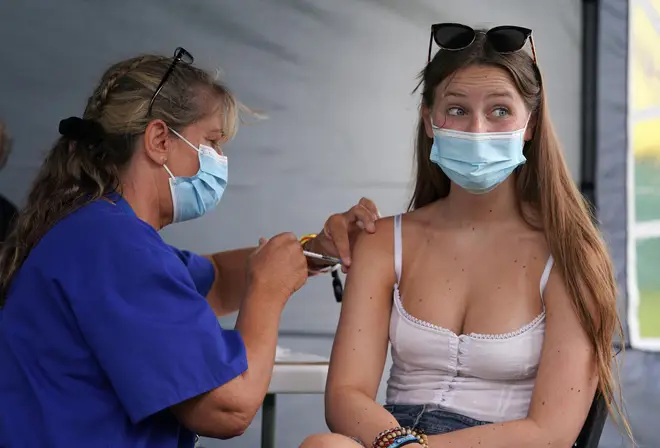
Ben Kentish 10pm - 1am
2 September 2021, 10:07 | Updated: 2 September 2021, 10:23

People who are fully vaccinated against Covid-19 have almost half the likelihood of developing long Covid if they contract the virus, a new study has suggested.
Researchers at King's College London also said that being admitted to hospital with the virus after being double jabbed was 73% less likely, and the chances of severe symptoms were reduced by almost a third (31%).
The study analysed data from more than two million people - logging their symptoms, tests and vaccine status on the UK Zoe Covid Symptom Study app between December 8 2020 and July 4 this year.
READ MORE: 'Not good enough': UK school Covid closures revealed as second longest in Europe
Some 6,030 app users reported testing positive for Covid-19 at least 14 days after their first vaccination but before their second, while 2,370 reported testing positive at least seven days after their second dose.

Professor explains third Covid jab for those with weakened immune systems
The most common symptoms, such as loss of smell, a cough, fever, headaches and fatigue, were milder and less frequently reported by people who were jabbed, the study suggested.
They also said people were half as likely to get multiple symptoms in the first week of illness.
Sneezing was the only symptom more common in those who had a first dose compared with those who had none.
People aged 60 or older who had both doses of a vaccine were more likely to have no symptoms at all than those who had not been jabbed, the study suggested.
The research, published in the Lancet, said: "We found that the odds of having symptoms for 28 days or more after post-vaccination infection were approximately halved by having two vaccine doses.
"This result suggests that the risk of long Covid is reduced in individuals who have received double vaccination, when additionally considering the already documented reduced risk of infection overall."
It added: "Almost all individual symptoms of Covid-19 were less common in vaccinated versus unvaccinated participants, and more people in the vaccinated than in the unvaccinated groups were completely asymptomatic."
The research team said their data suggested that frail, older adults and people living in more deprived areas were still at an increased risk but that the effects of the virus appeared to be less severe in those who are vaccinated.
They said their findings were relevant "for health policies post-vaccination, and highlight the need to balance personal protective measures in those at risk of post-vaccination infection with the adverse effects from ongoing social restrictions".
They added: "Strategies such as timely prioritisation of booster vaccinations and optimised infection control measures could be considered for at-risk groups.
"Research is also needed on how to enhance the immune response to vaccination in those at higher risk of post-vaccination infection."
Professor Tim Spector from King's College, and lead investigator of the Zoe Covid study, said: "Vaccinations are massively reducing the chances of people getting long Covid in two ways.
"Firstly, by reducing the risk of any symptoms by eight- to 10-fold and then by halving the chances of any infection turning into long Covid, if it does happen.
"Whatever the duration of symptoms, we are seeing that infections after two vaccinations are also much milder, so vaccines are really changing the disease and for the better. We are encouraging people to get their second jab as soon as they can."
The lead researcher, Dr Claire Steves, also from King's College, said the good news was that being double jabbed "significantly reduces the risk of both catching the virus and, if you do, [of] developing long-standing symptoms".
But she added: "Among our frail, older adults and those living in deprived areas the risk is still significant and they should be urgently prioritised for second and booster vaccinations."
The Health Secretary, Sajid Javid, said: "This research is encouraging, suggesting vaccines are not only preventing deaths but could also help prevent some of the longer-lasting symptoms.
"We have invested £50 million in research to better understand the lasting effects of Covid and over 80 long-Covid assessment services have opened across England as part of a £100 million expansion of care for those suffering the effects.
"It is clear vaccines are building a wall of defence against the virus and are the best way to protect people from serious illness. I encourage everyone who is eligible to come forward for both their jabs as quickly as possible."